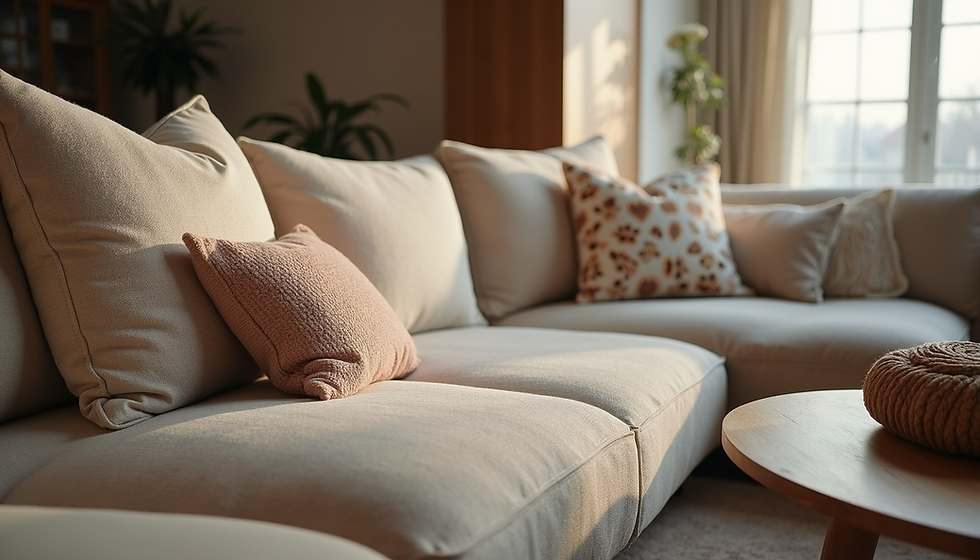Hiring an Interior Designer for Commercial Spaces: A Complete 2025 Guide
- Jayant Upadhyay
- Jun 28
- 4 min read

When it comes to creating functional, brand-aligned, and aesthetically pleasing commercial environments, hiring a professional interior designer is a strategic decision. Whether you're opening a retail store, designing an office space, or renovating a restaurant, an experienced interior designer can transform your vision into reality while ensuring your space meets both business and regulatory needs.
In this comprehensive blog post, we'll explore why hiring a commercial interior designer matters, the benefits they offer, the process they follow, and what to expect in terms of costs, collaboration, and outcomes.
Table of Contents
What is Commercial Interior Design?
Benefits of Hiring a Commercial Interior Designer
Types of Commercial Spaces That Need Interior Designers
The Design Process: Step-by-Step
What to Look for in a Commercial Interior Designer
How Interior Design Enhances Brand Identity
Budgeting and Cost Factors
Legal & Safety Compliance
Common Mistakes to Avoid
Final Thoughts and Next Steps
1. What is Commercial Interior Design?
Commercial interior design focuses on the planning, layout, and decoration of business environments. Unlike residential design, it takes into account workflow efficiency, customer experience, brand identity, accessibility, building codes, and durability of materials.
Key Elements:
Space planning
Lighting and electrical layout
Furniture and fixture selection
Signage and branding integration
Accessibility (ADA compliance)
Safety codes and regulations
2. Benefits of Hiring a Commercial Interior Designer
A. Expert Space Planning
A designer will optimize your layout to support traffic flow, operational needs, and ergonomic comfort.
B. Cost Efficiency
By avoiding design errors and making informed material selections, designers save time and money.
C. Vendor Access
Designers have established relationships with vendors, ensuring better pricing and sourcing.
D. Branding Alignment
Your space can reflect your company's values, culture, and message—creating a memorable customer impression.
E. Code Compliance
Professional designers ensure that everything—from electrical layouts to fire safety—is up to code.
3. Types of Commercial Spaces That Need Interior Designers
Commercial Type | Interior Design Considerations |
Office Spaces | Productivity, acoustics, collaboration zones |
Retail Stores | Brand experience, display layout, traffic flow |
Restaurants & Cafes | Ambiance, lighting, seating efficiency, hygiene zones |
Hotels & Hospitality | Guest comfort, aesthetic consistency, space zoning |
Healthcare Clinics | Hygiene, accessibility, calming color schemes |
Salons & Studios | Client flow, lighting for services, storage efficiency |
Educational Spaces | Safety, engagement, multifunctional layouts |
4. The Design Process: Step-by-Step
Step 1: Consultation
Understand your business needs, goals, space constraints, and budget.
Step 2: Concept Development
Create mood boards, color schemes, initial layouts, and style direction.
Step 3: Space Planning
Optimize square footage for both aesthetics and functionality.
Step 4: Material and Finish Selection
Choose flooring, paint, furniture, lighting, and decorative elements.
Step 5: Technical Drawings
Includes electrical layouts, plumbing plans, HVAC coordination, and lighting design.
Step 6: Procurement
Ordering and coordinating delivery of materials and furnishings.
Step 7: Implementation and Project Management
Supervision of on-site contractors and quality control.
Step 8: Final Styling and Handover
Accessorizing, signage placement, and final walk-through.
5. What to Look for in a Commercial Interior Designer
Portfolio of similar projects
Understanding of building codes
Experience with business-focused layouts
Project management capabilities
Transparent pricing
Client testimonials
Tech-savvy (CAD, 3D modeling, VR presentations)
6. How Interior Design Enhances Brand Identity
Your commercial space acts as a silent ambassador for your brand. Color schemes, materials, layout, and furniture all contribute to the brand story.
Examples:
A tech startup may use open layouts and industrial materials to emphasize innovation.
A high-end fashion boutique may incorporate luxe textures, ambient lighting, and custom displays.
A wellness clinic may use earthy colors, natural lighting, and acoustic treatments for a calming effect.
7. Budgeting and Cost Factors
Design Element | Average Cost Range (USD) |
Designer Fees | $5,000 – $50,000+ (depends on scope) |
Furniture & Fixtures (FF&E) | $20 – $200 per sq. ft. |
Lighting Design | $2,000 – $15,000 |
Flooring | $5 – $30 per sq. ft. |
Signage & Branding | $500 – $10,000 |
Paint & Wall Treatments | $1 – $10 per sq. ft. |
Permit & Inspection Fees | $500 – $5,000 |
Note: Costs vary widely depending on location, project scope, and customization.
8. Legal & Safety Compliance
A good commercial interior designer will work with your contractor and local authorities to ensure:
ADA accessibility compliance
Fire escape plans and extinguishers
Electrical code compliance
Ventilation and HVAC design
Commercial occupancy permits
9. Common Mistakes to Avoid
DIY Design in Commercial Spaces: May look good but can lack efficiency and safety.
Ignoring Lighting: Poor lighting ruins usability and ambiance.
Overlooking Acoustics: Particularly in open-plan offices and restaurants.
Choosing Residential Furniture: Not durable enough for high traffic.
Not Planning for Growth: Always design with future expansion in mind.
10. Final Thoughts and Next Steps
Hiring a commercial interior designer isn't a luxury—it's a necessity for modern businesses looking to maximize function, reflect their brand, and ensure compliance. From office layouts that boost productivity to retail spaces that captivate customers, the right designer will bring your vision to life while saving you time and costly mistakes.
Next Steps:
Define your budget
List your functional needs
Create a mood board or collect inspiration
Interview multiple designers
Ask for proposals and timelines
Need help finding a commercial interior designer? Contact our expert team for personalized recommendations based on your business type, goals, and location.



Comments